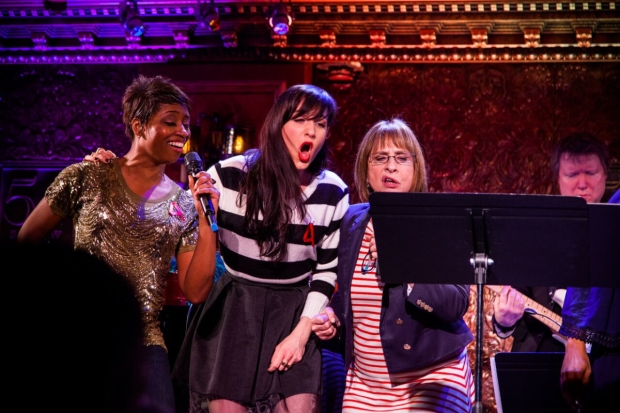A Is For's Martha Plimpton and Kellie Overbey Hand Broadway Its Scarlet Letter
Reproductive rights take center stage at Feinstein’s/54 Below for ”Broadway Acts for Women”.

(© David Gordon)
On May 1 at Feinstein's/54 Below, "A Is For" will host its second annual Broadway Acts for Women concert — the only event in the sea of Broadway fundraisers committed solely to the fight for women's reproductive rights.
"We know what the Broadway community can do when it's focused on making change," said three-time Tony nominee and A Is For cofounder Martha Plimpton. Broadway Cares/Equity Fights AIDS — the community's most prevalent and financially successful nonprofit — has been the poster child of that sentiment since its founding in 1987. So in 2012, Plimpton and fellow actress Kellie Overbey added their voices to the theater community's activist mix with an issue that bonded them during their 2006-07 Broadway run in the epic production of The Coast of Utopia.
"I think we found that we had a very similar point of view," said Overbey. "And a common outrage."
"I'm raised exclusively by single women…and all of them were feminists," said Plimpton, who has spent years lobbying on Capitol Hill and serving on the Board of Advocates for Planned Parenthood. "I grew up in a house where it was not uncommon for people to rant and rave about the injustices of the world at the dinner table…so in that world you just grow up with an inherent sense of the natural equality of all human beings."
Still, it wasn't for another five years after The Coast of Utopia that Plimpton and Overbey joined forces on A Is For.
"It was around the time that Sandra Fluke wanted birth control covered for Georgetown University insurance and Rush Limbaugh started slut-shaming her," said Overbey, referring to the Georgetown law student who advocated for contraceptive health care coverage at a congressional hearing in 2012.
"The way that she was treated, the names that she was called," Plimpton added — "This kind of hateful and misogynistic rhetoric revealed for the first time in a while what really motivates these laws and these restrictions." Required ultrasounds, 24-hour waiting periods, and earlier gestational limits are just a few of the legislative tactics states have been employing in increasing numbers to circumvent the federal right to privacy protected by the Supreme Court's Roe v. Wade decision.
"I think that a huge part of the problem in terms of [the way] our state governments [handle] women's reproductive health rights is stigma and shame — slapping a scarlet letter on any women who dared to even have sex, let alone to have an abortion," said Plimpton. "So I think we felt it was time to take a new approach to this fight."
Plimpton and Overbey irreverently embraced these "scarlet letters," and, like the storytellers they are, decided to build their organization, A Is For, around the idea of giving women who are saddled with the stigma of "Abortion" the agency to rewrite their own narratives. They even provide a scarlet "A" ribbon for their supporters to don proudly.
"We thought we would reappropriate the 'A' itself," Overbey explained. "So the idea behind A Is For is that your 'A' is for whatever you want it to mean."
Sarah Paulson, Jane Lynch, and Stockard Channing are just a few of the women who have reappropriated their own A's via video entries on the A Is For website ("Autonomy," "Adamant," and "Always" are their personal selections, respectively). And on May 1, Cecily Strong (the benefit's host), Betty Buckley, Jesse Tyler Ferguson, Lena Hall, Orfeh, Tituss Burgess, Lesli Margherita, and Rebecca Naomi Jones will also be lending their voices to the cause.

(© Heather Weston)
"Part of the effective stigma is that it turns the subject into a controversial one," said Plimpton. "We know it isn't controversial. We know the reality of reproductive health care. In states where abortion and reproductive healthcare is restricted or unavailable, we see a rise in maternal mortality rates, a rise in infant mortality rates, we see less involvement of women in political and civic life, we see unhealthier families, and we see more poverty. But it's a process to get people to feel comfortable speaking out about it."
Broadway Acts for Women has become an important part of this process — not only as a fundraiser (proceeds from the evening will be shared with Physicians for Reproductive Health, Mississippi Reproductive Freedom Fund, Jane's Due Process) but as an opportunity to tell a new story to a uniquely vocal and engaged community. "The good thing about working with people in any artistic community is they have the tendency to be a little bit more open to being challenging," said Plimpton.
Suddenly, an issue that has been branded as too bleak or taboo for public discourse is the center of an auction where your karaoke fever dreams meet your Broadway fantasies. On May 1, bidders can win prizes ranging from an in-home Michael Cerveris concert to a commissioned portrait by John Lithgow of them or their beloved pet and subsequently demand anything from a Tituss Burgess rendition of "Bohemian Rhapsody" to a Lena Hall "Lady Marmalade." ("Last year, Montego Glover did a Rihanna song she didn't know and she just improvised and riffed and it was one of the most gorgeous things I've ever heard," Plimpton delightedly remembered.)
As Plimpton and Overbey willingly admit, keeping A Is For afloat for the past four years has not been an easy task. "We all have day jobs, and half of us have careers in show business, which means that our work lives are not exactly under our own control," Plimpton said. "The fact that we're still as committed as ever — I'm so proud of that."
Though, as Overbey noted, the alternative would be far preferable. "We'd like to solve the problem and move on."








